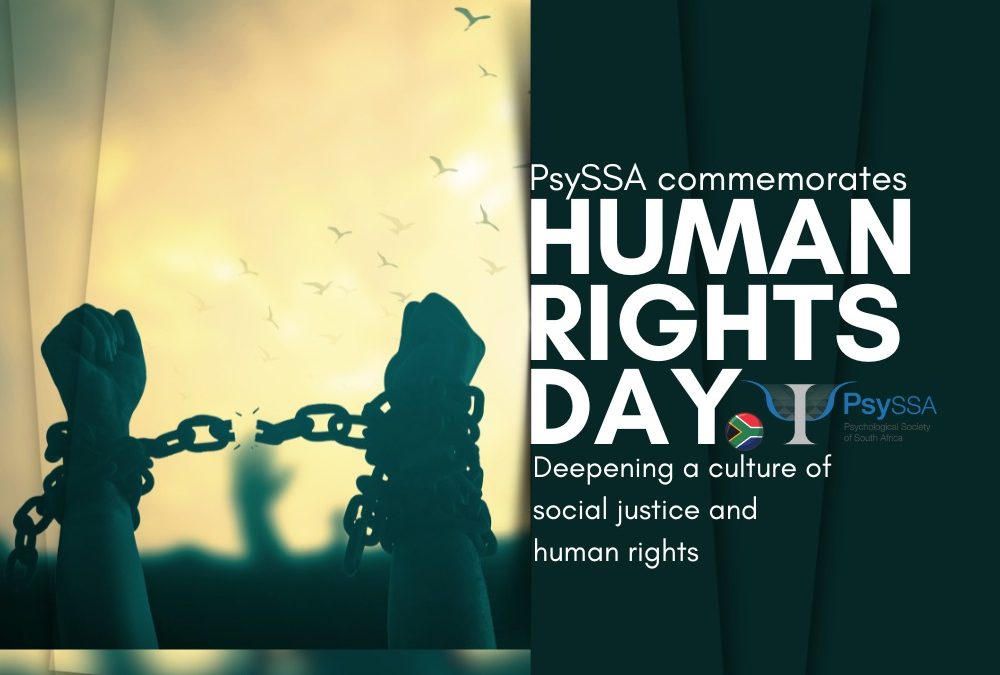
Human Rights Day – 21 March 2025


PsySSA Commemorates Human Rights Day – 21 March 2025
Beyond Commemorations: Advancing Social Justice and Human Rights
By: Justice Desk Africa and PsySSA’s Decolonising Psychology Division
On 21 March 1960, the township of Sharpeville became the site of one of South Africa’s darkest days. A peaceful protest against the apartheid regime’s oppressive pass laws ended in tragedy as police opened fire on an unarmed crowd of 5,000 people. Sixty-nine lives were lost, and hundreds more were wounded in what would come to be known as the Sharpeville Massacre. This event was a turning point in the struggle against apartheid, exposing the brutal nature of the regime to the international community and galvanising the fight for justice and equality. Today, we commemorate this day as Human Rights Day, not only to remember those who died but also to reflect on the state of human rights in South Africa and the unfinished work of social justice.
Since the fall of apartheid in 1994, South Africa has made considerable strides in establishing a constitutional democracy rooted in human rights. The Bill of Rights enshrined in our Constitution promises dignity, freedom, and equality for all. Yet, the realities of daily life tell a different story one where the legacies of colonialism and apartheid continue to manifest in systemic injustices. Economic inequality remains one of the most pressing issues, with wealth still largely concentrated in the hands of a few, while the majority, particularly Black South Africans, remain trapped in cycles of poverty. Racial capitalism, where economic power is still racialised, further entrenches these divides, making true social justice an elusive goal.
Gender-based violence continues to plague the country, with women and LGBTQIA2S+ individuals disproportionately affected. Despite progressive laws and policies aimed at combating gender inequality and violence, the failure of the state to implement these protections effectively has left many vulnerable. Xenophobia also rears its head repeatedly, with foreign nationals scapegoated for socio-economic hardships, undermining the principles of Pan-Africanism and Ubuntu that should be guiding our democracy.
Moreover, the very institutions meant to uphold human rights often become perpetrators of systemic violence. Police brutality, reminiscent of apartheid-era repression, continues unabated, particularly in marginalised communities. Access to basic services such as quality education, healthcare, and housing remains unequal, revealing a persistent gap between constitutional ideals and lived experiences. Corruption within government structures further erodes public trust, diverting resources away from those who need them most.
In light of these ongoing struggles, deepening a culture of social justice and human rights is more than a moral imperative – it is a necessity for South Africa’s democratic survival. Symbolic recognition of human rights is not enough; there must be a concerted effort towards structural transformation. This requires not only policy reforms but active citizen engagement in dismantling systems of oppression. The Constitution must be more than a document, it must be a living, breathing force that informs legislation, governance, and social action.
Justice is not a passive ideal bestowed from above; it is a collective struggle that must be fought for and defended daily. True human rights are realised in solidarity with the most marginalised. This means standing against economic exclusion, advocating for gender justice, challenging xenophobia, and demanding accountability from those in power. Human Rights Day must serve as more than a moment of remembrance – it must be a call to action!
Organisations like Justice Desk Africa embody this commitment by working on the ground to educate, empower, and advocate for those whose rights are often disregarded. Their work highlights that real transformation begins with grassroots movements that challenge oppressive structures and foster communities grounded in dignity and equity.
As we reflect on the Sharpeville Massacre and the sacrifices made for our freedoms, we must ask ourselves: What are we doing to uphold the values that those who came before us fought for? Are we complacent in the face of injustice, or are we actively working towards a society where human rights are not a privilege, but a lived reality for all?
The path to a just and equal South Africa remains fraught with challenges, but it is a path we must walk together. Only through collective responsibility, sustained activism, and unwavering commitment to social justice can we ensure that the horrors of the past do not define our future. Let us honour the memory of Sharpeville not just in words, but in action – by building a society that truly upholds the dignity and rights of every individual.








